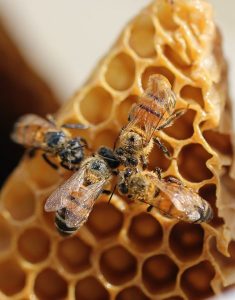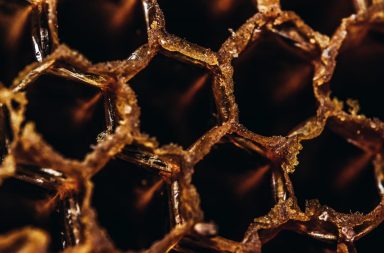Manuka honey has certainly become a superfood, alongside the acai berry and avocado. We can use Manuka honey for almost everything, including brighter skin and healing wounds, but what about the side effects to Manuka honey?
Acai berry: all about the superfruit
Produced in New Zealand, Manuka honey has been used in its home country for centuries as a natural medicine and a natural sweetener.
But recently, this sweet substance has grown in popularity for its health and beauty benefits around the world.
What we want to know is everything about Manuka honey side effects, are there any? Or is this product really as sweet and beneficial as it sounds?
Let’s find out!
What is Manuka honey?
Manuka honey is produced in New Zealand through the pollination of the native Manuka bush.
It has fast become one of the most popular varieties of honey owing to its numerous health benefits and versatility.

Photo credit: Dmitry Grigoriev via Unsplash
Manuka honey is also exceptionally rare, due to the unusually short blossoming period of the Manuka bush. This short window in which the plant flowers means that bees can only collect the nectar and produce the honey for a brief time during the year.
So, what makes Manuka honey so full of health benefits?
Well, Manuka honey contains many properties that are beneficial to the human body. These include antibacterial properties, anti-inflammatories, antiseptics and even antiviral – all of which come directly from the Manuka plant!
Yes, when the bees collect the nectar from the flowering Manuka plant, all of these incredible properties are extracted along with it, and end up contained within the Manuka honey!
Of course, the rarity of Manuka honey and its unique properties, do make the cost a little higher than your average garden honey.
In fact, depending on the quality of the Manuka honey, it can cost anything between £30 to upwards of a thousand pounds!
It is worth noting, if you are planning on purchasing Manuka honey, that you need to look out for the UMF (unique Manuka factor) label on the jar. This will be graded at 10 or upwards, meaning the higher the grade, the higher the properties the honey contains.
But what about the Manuka honey side effects?
Well, let’s first take a look at the benefits of Manuka honey!
Manuka honey: what are the benefits?
We know that Manuka honey contains numerous properties including antiviral, anti-inflammatory, and even antiseptic – pretty amazing for a jar of honey!
But what are the health benefits of using Manuka honey?
Well, Manuka honey has multiple uses, not only for drizzling on our granola at breakfast! In fact, in recent times, DIY Manuka honey hair masks have become very popular! Yes, it might sound strange to use something so sticky on your hair – but the results are utterly worth it!
How to make: DIY Manuka honey hair mask
Of course, there are far more health benefits to Manuka honey than smooth and silky hair!
Let’s take a look at the health benefits of Manuka honey before we look at potential Manuka honey side effects.
To treat sore throats and colds
Yes, if you’re suffering with a sore throat, many people believe eating a spoonful of Manuka honey will help to soothe it.
The sweet sticky substance may even help to relieve coughs and even asthma.
How? Well, the honey helps to produce saliva, providing lubrication in the throat and windpipe, potentially reducing the urge to cough!
Manuka honey: benefits for asthma
Healing properties
We know that Manuka honey has been used in native New Zealand for centuries for its medicinal properties, but can you really use Manuka honey to treat wounds?
Well, yes, Manuka honey is used to treat minor cuts and burns!

Photo credit: Bermix Studio via Unsplash
Manuka honey contains hydrogen peroxide, the main component of its antibiotic properties. In addition to that, this natures miracle also contains methylglyoxal (MG) which gives the honey antibacterial properties.
Many people believe, when applied topically to minor cuts and burns, Manuka honey may be able to speed up the healing process – amazing!
It is worth noting here that Manuka honey used to treat wounds and burns is a medical grade honey – not the Manuka honey from the kitchen cupboard.
Aids digestion
Some people believe that Manuka honey can also ease digestive troubles including bloating, digestive inflammation, and gastrointestinal problems.
To use Manuka honey to aid digestion, you can add a teaspoon of Manuka honey in hot tea, or eat it straight from the teaspoon.
Skin and hair
As we know, Manuka honey has become an immensely popular product in the beauty industry.
Yes, this sweet and delicious substance can provide endless benefits when applied to your locks. In fact, Manuka honey can reduce frizz, deep condition and may even reduce the chance of split ends!
So, what about your skin? Well, Manuka honey can be used as a cleanser and even a face mask to give you softer and brighter skin.
Some people have also reported that anti-inflammatory properties in Manuka honey can also help with acne and blemishes when applied topically!
How to: use Manuka honey for brighter skin
Ok, so now we know the health benefits that Manuka honey can provide. But what about side effects?
Let’s take a look at Manuka honey side effects!
Manuka honey side effects: what are they?
As so many of us now use Manuka honey for such a wealth of different things, medicinal, beauty, even culinary – it is only fair to ask, are there any side effects to this natural substance?
Well, like any product out there, Manuka honey may not agree with everybody.
So, what are the potential side effects to Manuka honey?
Allergic reaction
As with any product or food produce on the market, there is a chance of allergic reaction to Manuka honey.

Photo credit: Shelby Cohron via Unsplash
Whilst this may not be a common side effect, there is a possibility that if you are allergic to bee venom, or pollen, that you may have a reaction to Manuka honey.
Symptoms of an allergic reaction can vary greatly, but may include coughing and wheezing. Other symptoms may show as rashes, difficulty breathing or even nausea and vomiting.
High blood sugar
Manuka honey may be a natural sweetener, but it is still sugar. This means that when ingested, it may still affect your blood sugar levels.
It is thought, however, that Manuka honey may be less likely to have an impact than refined sugar, however it is still a possible side effect of ingesting Manuka honey.
Weight gain
Again, as Manuka honey is a natural sweetener, if not taken in moderation, it may lead to weight gain.
Manuka honey may be used as a supplement, and is of course natural and organic. However, don’t forget to factor it into your daily calorie intake.
Weight gain is not necessarily a common side effect of Manuka honey, as it is down to your personal use.
So, Manuka honey may have some side effects when used as both a natural medicine and a natural sweetener, but when used safely it can certainly provide a lot of benefits to our health!
Have you ever tried using Manuka honey for health or beauty? Tell us in the comments below!


